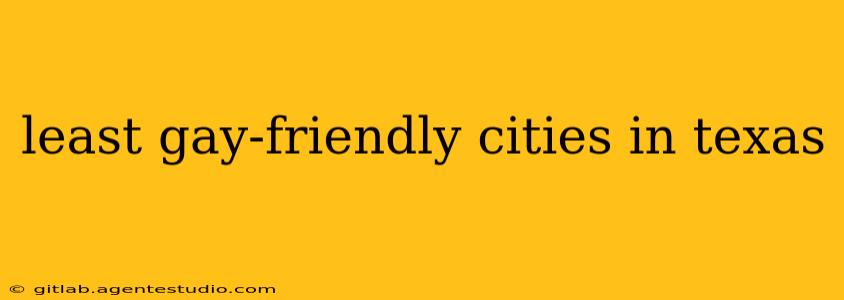Least Gay-Friendly Cities in Texas: A Complex Issue
Texas, a state known for its vast landscapes and diverse population, presents a complex picture when it comes to LGBTQ+ inclusivity. While some cities champion LGBTQ+ rights and foster vibrant communities, others lag behind in acceptance and legal protections. It's crucial to understand that determining the "least gay-friendly" cities requires careful consideration beyond simple metrics, as experiences can vary greatly within a single community. This exploration will delve into factors contributing to perceptions of LGBTQ+ unfriendliness in certain Texas cities, acknowledging the limitations of any single ranking system.
Understanding the Nuances of "Gay-Friendly": Simply labeling a city as "gay-friendly" or not is an oversimplification. True inclusivity encompasses various facets:
- Legal Protections: The presence (or absence) of anti-discrimination laws protecting LGBTQ+ individuals in housing, employment, and public accommodations significantly impacts lived experience.
- Social Acceptance: This encompasses community attitudes, the prevalence of LGBTQ+ hate crimes, and the overall feeling of safety and belonging within the community. Quantifying this is challenging and often relies on anecdotal evidence and community perceptions.
- Visibility and Representation: The presence of LGBTQ+ organizations, businesses, and community events contributes to a sense of belonging and visibility. A lack of these could indicate a less welcoming environment.
- Political Climate: Local and state-level politics significantly influence the legal protections and social acceptance afforded to LGBTQ+ individuals. Conservative political climates can often correlate with less LGBTQ+-friendly environments.
Factors Contributing to Perceptions of Lower LGBTQ+ Friendliness in Certain Texas Cities:
While precise rankings are difficult and potentially misleading, certain factors frequently emerge when discussing cities perceived as less LGBTQ+-friendly in Texas. These include:
- Limited Legal Protections: Some smaller Texas cities might lack comprehensive anti-discrimination ordinances, leaving LGBTQ+ residents vulnerable to discrimination.
- Conservative Political Landscape: Cities with predominantly conservative political leadership and electorates may be less likely to prioritize LGBTQ+ rights or enact inclusive policies.
- Lower Visibility of LGBTQ+ Community: A lack of visible LGBTQ+ organizations, businesses, or community events can lead to a feeling of isolation and invisibility for LGBTQ+ residents.
- Higher Rates of Hate Crimes or Incidents: While data on hate crimes can be incomplete, a higher than average occurrence can contribute to a less safe and welcoming environment.
Important Note: It is crucial to avoid generalizations about entire cities. Even within a city considered less LGBTQ+-friendly overall, pockets of acceptance and support exist. Likewise, cities generally considered more welcoming can still have areas or groups that are less accepting.
Moving Forward: Instead of focusing on simplistic rankings, it's more constructive to advocate for policies that enhance LGBTQ+ rights and protections throughout Texas. This includes promoting inclusive legislation at the state and local levels, supporting LGBTQ+ organizations, and fostering open dialogue to combat prejudice and discrimination.
This discussion aims to provide context and insight into the complexities surrounding LGBTQ+ inclusivity in Texas. It's important to remember that experiences are diverse and subjective, and generalizations should be avoided. Further research and engagement with local LGBTQ+ communities are essential for a more complete understanding.

